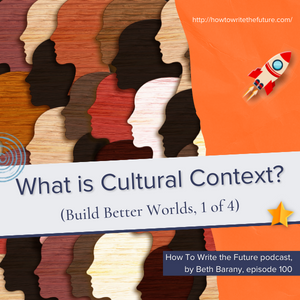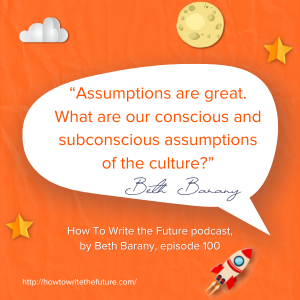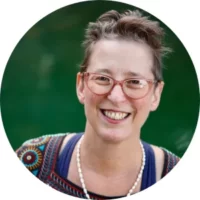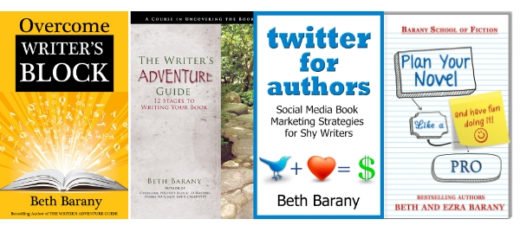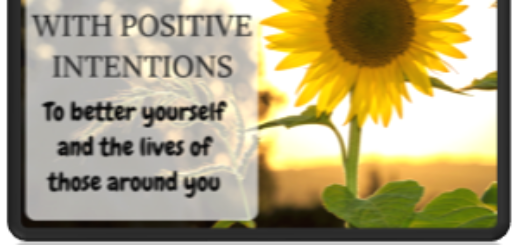What is Cultural Context? (Build Better Worlds, 1 of 4)
What is Cultural Context? (Build Better Worlds, 1 of 4) – How To Write the Future podcast, episode 100
“Assumptions are great. What are our conscious and subconscious assumptions of the culture?” – Beth Barany
In this episode of How To Write the Future, podcast host Beth Barany celebrates her 100th episode with a special thanks to listeners and dives into the importance of cultural context in storytelling, focusing on world-building in science fiction and fantasy genres including sharing her thoughts on the book Build Better Worlds.
Platforms The podcast is available on Apple Podcasts| Buzzsprout | Spotify | Podcast Addict |Amazon Music | Youtube
RESOURCES
Build Better Worlds: An Introduction to Anthropology for Game Designers, Fiction Writers and Filmmakers by Michael Kilman and Kyra Wellstrom **https://books2read.com/bbwhtwtf**
Kelly Diels, We Are The Culture Makers: https://kellydiels.com/
Free World Building Workbook for Fiction Writers: https://writersfunzone.com/blog/world-building-resources/
Plan Your Novel Like A Pro: https://writersfunzone.com/blog/plan-your-novel-like-a-pro-and-have-fun-doing-it/
Sign up for the 30-minute Story Success Clinic with Beth Barany: https://writersfunzone.com/blog/story-success-clinic/
Get support for your fiction writing by a novelist and writing teacher and coach. Schedule an exploratory call here and see if Beth can support you today: https://writersfunzone.com/blog/discovery-call/
About the How To Write the Future podcast
The *How To Write The Future* podcast is for science fiction and fantasy writers who want to write positive futures and successfully bring those stories out into the marketplace. Hosted by Beth Barany, science fiction novelist and creativity coach for writers. We cover tips for fiction writers. This podcast is for readers too if you’re at all curious about the future of humanity.
This podcast is for you if you have questions like:
– How do I create a believable world for my science fiction story?
– How do I figure out what’s not working if my story feels flat?
– How do I make my story more interesting and alive?
This podcast is for readers too if you’re at all curious about the future of humanity.
Transcript for episode 100 What is Cultural Context? (Build Better Worlds, 1 of 4)
Hey everyone, Beth Barany here for How To Write the Future podcast. I am your host, a creativity coach for writers, a science fiction and fantasy writer myself. And also an all around grab bag, deeply curious person. This podcast is for science fiction and fantasy writers who want to create positive optimistic futures because I believe that when we vision, we help make it so.
And then, especially when we put it into stories, develop those stories, and gift those stories to the world, we help shape humanity.
And as Kelly Diels says, “We are the culture makers”
Celebrating this 100th Episode
It’s kind of arbitrary, but it is still an important milestone. This is my 100th podcast, episode for How To Write The Future. And it’s quite an accomplishment.
I’ve learned so much about production and had a lot of fun, creating everything.
And doing interviews and putting together the video component also of this podcast, because you can watch it on YouTube. I couldn’t have produced this podcast, and gotten to this place of a hundredth episode if I didn’t have the help of my team.
I have in the backend of my business four people working for me and two in particular, really supporting this podcast.
And one in particular who has really been my first listener, given me feedback helped me shape these episodes and that’s Kerry-Ann McDade,
My virtual podcast assistant.
So thank you so much. Kerry-Ann for helping me get to that 100th episode. I hope we have the two hundredth and the 300th. Et cetera on and on. This has been so much fun.
And then I also want to thank Jasper Ezekiel, who’s been my editorial assistant and supported us on the promotion side.
Thank you so much, Jasper.
He’s also helped us with quality control. And it’s I’m just so pleased to have you on the team.
Last but not at all least is you dear listeners. your comments, your questions, your reviews, your eagerness to be a part of this podcast with the Story Success Clinics. So wonderful.
Thank you so much.
And all my guests that I’ve interviewed. And, thank you so much.
I look forward to many more episodes of How To Write The Future podcast. And hope you will stay with us for the next 100.
All right, please enjoy this episode, which, I had so much fun making and also producing and putting together for you.
On with the show.
New Series: Build Better Worlds book discussion
I’m going to do another short series for you, four episodes during the next four weeks and it’s going to be highlighting Build Better Worlds, subtitled An Introduction to Anthropology for Game Designers, Fiction Writers and Filmmakers, and the authors are Michael Kilman and Kyra Wellstrom.
So I am gonna be creating these short episodes to highlight points in their book so that you can as they say, build better worlds, create richer worlds, whether you write science fiction, whether you write fantasy, and if you’re listening and you’re not writing in those two genres and your writing in contemporary or historical, or something else, some mashup, whatever it is that you’re creating, I want to help you create enriching worlds that your reader can disappear into.
All right.
Let’s Talk Cultural Context
So today I wanna talk about context and I’m going to read a little bit from their book and then I’m going to discuss it. And I would love to hear what you think about context and I will also apply it to you as a writer.
How does it impact your story creation?
How can it impact your writing and editing phase?
And also how you share your world with your readership in your marketing?
So I’ll see if I can do- that’s pretty ambitious. Let’s see how it goes. All right.
Chapter Three
So they say here in chapter three that they’re going to explore many elements of cultural context. Including environment, biology, history, language, and culture. Your context begins before you take your first breath and as you grow, it influences your identity. Every cultural system has a context, which includes a body of knowledge and a number of conscious and subconscious assumptions about what the world is, why we are here, where we are going, and what is good and right.
So I’m going to pause here.
There’s a few more paragraphs I want to share, but what I want to say about this is when you are building your world.
Brainstorming or Drafting Phase
So this is at the beginning phase, maybe I’m in the first drafting phase, or even before in your brainstorming phase, you want to think about the greater cultural context for your characters for the world you’re building.
And how do you do this? My favorite way is to interview my characters as I do my story planning. And I have two resources for you to guide you on this one is free. One is paid.
The free one is the World Building Workbook for Fiction Writers, which I offer to you. You can sign up for that.
The link is in the description.
And then the other is, if you want to put this in a greater context, as you’re building your story, then I highly recommend my Plan Your Novel Like A Pro book that comes with a bonus PDF workbook that you could purchase: digital, print, wherever books are sold. And this will help you with the whole novel planning process. And it’s written for genre fiction writers. So that’s in the brainstorming phase and in the writing phase.
In the writing phase, do your best to bring in sensory details and see if you can write the cultural context from the perspective of your point of view character if you’re writing for multiple characters. If you just have one character, then show the world through their eyes.
Assumptions are great!
So their assumptions, Assumptions are great. What are our conscious and subconscious assumptions of the culture?
And you can start with yourself. What do you assume about your own culture? And see if you can make conscious some of the subconscious things, I’m just going to pick a mundane thing here. Every Tuesday morning, our recycling is collected. And every Friday morning the regular trash is collected.
And actually there’s also compostable trash, that is recycled and collected. And I don’t know what day that is because I have a compost here on my patio. So anyway, the cultural assumption around garbage collection: We know that every week our garbage will be collected. I barely have to think about it. I do have to remember to take out the trash.
And if I don’t, what happens? There are consequences.
And what if I wanted to write a story about the consequences of not taking out the trash?
Or about the life cycle of what happens with the compost.
I think a lot about space debris. That’s a form of trash. Now nobody is claiming responsibility for that.
So what happens when no one claims responsibility for trash? How does that influence the way people live?
Before trash was regularly collected several hundred years ago, the streets would be full of refuse. It would be normal. And that you could even say would be an unconscious assumption happening.
People.
Oh yeah. That’s just the way it is.
So think about for your story. Where does the character say, oh, that’s just the way it is. And where might your character say, how come things are like that?
Now when we create made up worlds, the reader does not know the context. If you’re writing on contemporary setting, or even a historical setting that people know a lot about, you don’t have to explain everything. But if you are creating a setting that is entirely made up, you do need your point of view character or an omniscient narrator to be sharing with us the cultural context, how things work.
World Building when you edit
Think about that as you work on your world-building. Now in edits, I do want to mention. you’re going to want to make sure that a reader who knows nothing about your world, so not someone who’s reviewed your book a lot, like an editor or a critique partner, but a new person could read this and understand a little bit about the broader context. I do see that as a problem when I edit people’s work. They assume we know what’s in their head, but sometimes you have to be extra explicit, so we understand how things work inside of your amazing storyworld that you invented.
And then in marketing, you want to make some things really explicit. And I’ve seen this in lots of people’s marketing and I’ll just use my own Janey McCallister space station mystery series as an example. I believe I have in my marketing, especially for Book 1, I say. In 2130…
So now we know in a future time. At and I give the name of the hotel, Uh, Bijoux de L’Etoile, I made up this fancy French word, French name, and I said a high-end casino orbiting Earth, you can get anything you desire. So right away, we have some assumptions that I make explicit to the reader. They don’t have to guess. They know they’re in a high end casino and we know orbiting Earth. And this is a place where anyone can get what you desire.
Now I’ve set the setting of set the world, the context. I have set the context of the story.
When you’re marketing and that’s part of my back cover blurb, that’s part of the material that goes with the book, wherever it’s being marketed online.See if you can find the big assumption in your world that allow a reader today to situate themselves in your context.
Now there’s some things that are very familiar, like the idea of a high end casino. Most people know what that is. I don’t have to explain what is a high end casino.
And the idea of orbiting Earth. We all know satellites, orbit the Earth. I don’t tell you where it is an orbit. That doesn’t really matter to understand that the greater sense of the story at this point as this first sentence.
And the fact that you can get anything you desire kind of sets up the theme of desire, the theme, wow, getting anything you want, ooh. What are the implications of that?
Also a context that I people might find intriguing… oh, what does that mean? How is that going to be tied into the mystery?
I just want to share with you how your cultural context or the context for your story world, you want to signal to the reader in your marketing. All right.
Context is the wider cultural context
So I just want to say a little bit more about context coming back to the book _Build Better Worlds_. So they say:
“Context is the wider cultural experience. It is all the knowledge and history a culture possesses at any specific moment.”
Your point of view character may not know this broader context.
And even as an author, we don’t know everything. But do your best to think about the broader cultural context: the environment, biology history, language, how things are made, materials, how materials get into the hands of people, how food is brought to people, the technology that underpins daily life.
So I’m going to stop here and stay tuned for next week where
I’m going to talk about another aspect of Build Better Worlds
Get Your Own World Building Workbook for Fiction Writers
And just a quick reminder. If you need help for world building, and you want a free guide, check out my World Building Workbook For Fiction Writers to get started.
And if you want, a curriculum in your hands on how to take your awesome story idea and turn it into an outline or a story plan so that you can write your book, check out _Plan Your Novel Like A Pro that I wrote with my husband Ezra Barany.
Book Coaching with Beth Barany
And I also want to let you know that I have a few spots to work one-on-one with me. And if you’re called to do that, just please reach out, email me, contact me through my website. And we’ll get that conversation going. And we’ll see if we want to work together. Because if you are dedicated, committed, focused, and I’m going to say it ambitious because writing a novel is a big ambitious goal, then come, Let’s talk. I’d love to be in conversation with you.
All right, that’s it for this week.
Like, subscribe, share
BETH BARANY: Please subscribe wherever you get your podcasts. And. It would be my greatest pleasure if you pass this on to a friend or a colleague who,would benefit from this because word of mouth, man, word of mouth is so powerful. All right.
Write long and prosper.
Loved this episode? Leave us a review and rating here: https://www.buzzsprout.com/2012061
ABOUT BETH BARANY
Beth Barany teaches science fiction and fantasy novelists how to write, edit, and publish their books as a coach, teacher, consultant, and developmental editor. She’s an award-winning fantasy and science fiction novelist and runs the podcast, “How To Write The Future.”
Learn more about Beth Barany at these sites:
Author site / Coaching site / School of Fiction / Writer’s Fun Zone blog
CONNECT
Contact Beth: https://writersfunzone.com/blog/podcast/#tve-jump-185b4422580
Email: beth@bethbarany.com
LinkedIn: https://www.linkedin.com/in/bethbarany/
IG: https://www.instagram.com/bethbarany/
TT: https://www.tiktok.com/@bethbarany/
FB: https://www.facebook.com/bethbarany
X: https://twitter.com/BethBarany
CREDITS
- EDITED WITH DESCRIPT: https://www.descript.com?lmref=_w1WCA (Refer-a-Friend link)
- MUSIC CREDITS : Music from Uppbeat (free for Creators!): https://uppbeat.io/t/soundroll/fuzz-buzz License code: UMMKDRL02DFGKJ0L. “Fuzz buzz” by Soundroll. Commercial license: https://musicvine.com/track/soundroll/fuzz-buzz.
- DISTRIBUTED BY BUZZSPROUT: https://www.buzzsprout.com/?referrer_id=1994465 (Refer-a-Friend link)
- SHOW PRODUCTION BY Beth Barany
- SHOW CO-PRODUCTION + NOTES by Kerry-Ann McDade
C 2024 BETH BARANY
For more “How To Write the Future” episodes, go here.
If you’d like to invite Beth onto your podcast, drop her a note here.

